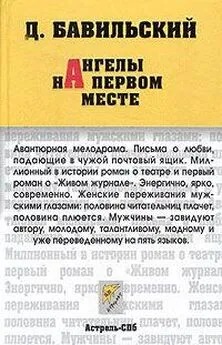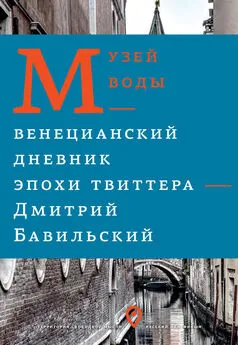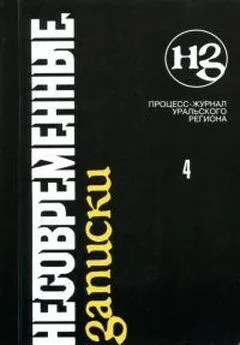Дмитрий Бавильский - Несовременные записки. Том 3
- Название:Несовременные записки. Том 3
- Автор:
- Жанр:
- Издательство:Фонд «Галерея», Фонд «Юрятин»
- Год:1996
- Город:[,б. м.]
- ISBN:5-87772-024-4
- Рейтинг:
- Избранное:Добавить в избранное
-
Отзывы:
-
Ваша оценка:
Дмитрий Бавильский - Несовременные записки. Том 3 краткое содержание
Несовременные записки. Том 3 - читать онлайн бесплатно полную версию (весь текст целиком)
Интервал:
Закладка:
1996, Челябинск
ПРОЗА
Евгений Мусихин
ВДАЛИ ОТ АРКТИКИ
FAR FROM THE ARCTIC
Екатеринбургский литератор Верников предложил мне рукопись на английском языке. Объяснил: «Автор живёт в Каменск-Уральске, он не писатель; всё, что описано в рассказе, — правда; собственно и сам рассказ написан с целью, чтобы один из его героев, который вряд ли когда вернётся в Россию, имел бы хотя бы теоретическую возможность прочесть (а он воспитывается теперь в англоязычной среде) о том, о чём написано в рассказе; попытки опубликовать данный опус за рубежом и в других российских изданиях — принесли то, что принесли, то есть ничего; и вот поэтому, может быть «НЗ» возьмётся, хотя я понимаю… и т. д.»
Я благодарен Александру Верникову, что он избрал именно наш журнал для публикации рассказа Евгения Мусихина «Вдали от Арктики», ибо предоставить журналу шанс пусть даже теоретически поучаствовать в реальности через литературу — это большая удача (во всяком случае для нас). Мы только попросили Евгения Мусихина (помня о собственных читателях) перевести рукопись на русский и теперь публикуем оба текста в подбор. Надеюсь, не стоит говорить, что мы желаем Евгению Мусихину и его сыну. Это настолько очевидно, что… ну и так далее…
В. К.The town stands on the high banks of a swift meandering river which cuts its way through massive rocks grown over with pine and birch trees. At one of its countless bends the stream forms a large deep hollow, and if you appear on its eastern verge you will see a marvellous panorama of the old burg whose small ridge-roofed houses are scattered over the slopes of the river banks. Have you ever seen seaside settlements squeezed between mountains and sea-waters? Their houses are dotted here and there on hill-sides and resemble a flock of children who once appeared at the top of a mountain and then all of a sudden ran headlong downwards, to the sea, and only the immense mass of brine stopped the first of them just on the shore. And so do houses of the town — in the same way they resemble a flock of children who rushed down, to the water — although the obstacle here occurred to be not so considerable as the endless expanse of sea, and some of the runners managed to skip over the narrow band of the river; but too much of their energy had been spent on this vehement running, and only few of them found strength to climb the opposite slope of the hollow — and not very high. Simile of such a kind — the one above being not faultless, though, — inevitably comes to the mind of a beholder who stands on the brink of the hollow fascinated by the perspective lying before his eyes.
Impressive as it is, the picture of the old burg would not be so charming without a church which towers above the right bank and the houses clustering thereupon. Not a chef d'oeuvre of architecture, an edifice of clumsy and awkward appearance — when you examine it from near — it looks magnificent and at the same time exquisite at a distance which conceals its architectural drawbacks and emphasizes merits, the perfect combination with the landscape being the first and incontestable one. Viewed from different points of the vast hollow where the town is strewn, the church blends with the scenery in different ways, but invariably reigns over the locality. Like a conscientious custodian called upon to retain the town in its original antiquity, the church keeps the primeval fascination of the old modest dwellings, with its magnificence ousting high newly-built structures, such as a TV-mast or a factory stack, but into the background of the sight.
Houses on the left bank are not so numerous though are bunched as densely as their counterparts on the other side. This half of the hollow is scarred far and wide with deep ravines, their steep slopes grown over with young pines about twenty feet high, their beds shadowed with old thickset poplars — mixture of woodland and urban trees. There are several brooks flowing into the river, their channels overrun with tall weeds and stunted bushes; they dry up in hot summers and get frozen down to the bottom in winters. Quite an unsophisticated landscape, judging by the words describing it; but when it opens up before your eyes from elevation you can't but feel that our trivial three dimensions wouldn't have been sufficient to create the intricate yet precise contours of this picture — a projection of the bizarre terrestrial relief, a fragment of the multifaceted space brought into being a long time ago.
Situated almost in the middle of a great continent the town stands far away from ocean coasts though sometimes cold breath of the Arctic or warm and moist air of the Atlantic — regardless of season — reach it and make townsfolk grumble customarily about changeability of the weather. But a little boy who one cold windy day at the beginning of June strode along a path winding between hills and ravines of the left bank didn't intend to complain of the climatic vicissitudes to a man who was with him, for all these chats about the weather are the privilege of mature age, whereas the boy was only five and had a lot of more interesting things to talk about.
Slim and in a childish way slightly awkward in movements, he went hand in hand with the man continually throwing up his head to glance at his companion and talking something in a clear voice with lively boyish intonations. His big brown eyes were sparkling, and his auburn hair was showing from under his knitted cap giving his lovely face a bit mischievous yet serious expression — that of an experienced traveller.
The boy's companion was a burly man with green eyes and dark hair. He had recently reached the age of John Bonham — the unexcelled genius of drum-craft who passed away in a desolate cottage in 1980 being thirty-one years old and was now the subject of a conversation between the two.
'Was John Bonham born by a mummy, like me?' the boy asked.
'Of course, kiddy.'
'And Robert Plant too?'
'And Robert Plant too.'
'And Jimmie Page too?'
'And Jimmie Page too, and John Paul Jones too. All the people are born by their mothers. So don't ask all the same about each.'
'I see,' said the boy, customarily throwing up his head and giving the man a look of his brown eyes. 'Do you know why I like him? Because I like the way he plays drums… Oh, let's go here!' he shouted when they got to the very brink of a steep ravine, and pointed downwards, at a lazily flowing brook.
'Why here?' the man asked.
'Cause I want,' the boy responded, in a-matter-of-course way, but not capriciously — just trying to explain the reason of his choice.
They cautiously descended the steep slope and stopped by the babbling flow for a minute. Then the boy pointed upwards, at the opposite brink of the ravine:
'Let's go there.'
Now they had to surmount an almost vertical ascent. Having clasped the boy's hand tight the man began to scramble up the slope, with his free hand clinging to stones and stems of trees and tall grass. Soon they stood on a path which stretched along between the brink of the ravine and a dense wall of young pine trees. The boy went to the right; having covered about thirty yards he stopped and looked back at the man who was after him.
The place where the boy lingered occurred to be a tiny glade of regular octangular form. Pines surrounding it restrained gusts of cold wind and filled the space with calming murmur, and their spreading crowns formed a kind of an almost impenetrable vault.
'Daddy, look what I've found!' the boy shouted not taking his eyes off the man who was approaching him.
'"Well, what have you found?' the man asked with a smile on his face.
"Daddy, that'll be our castle and we shall live here,' the boy declared standing in the middle of the glade. 'You know, Daddy, I've been looking for a place like this for such a long time. I say, that'll ekzactly be our castle.'
'But why castle?' asked the man keeping a smile, 'Can't it be just a log cabin?'
'No, this is a castle,' his son answered. 'There's a forest all around, don't you see?'
'D'you mean that log cabins don't occur in forests?'
'Yes, they do, but castles do too And this one — look, it stands just by the edge of a precipice, like a real castle.
…But it's shaky,' he added after a pause. 'Let's strengthen it, Dad. Go and bring a lot of stones, please.'
His face was radiant with a happy smile. Making two steps the man squatted down and took the boy's hands into his — they were ice-cold.
'You're all frozen, sonny,' he said.
'Certainly, I am,' the boy agreed. 'But if we build firm walls of hard stones, it'll be warm indoors, yes?'
'And where have you seen stones?'
'Why — this one, for instance,' said the boy and picked up a dead pine branch from the ground. 'Look, Daddy. There's a lot of them, don't you see? Help me gather them.'
They went in opposite directions and soon returned each with an armful of dry wood. After that they began to arrange them lying on the ground in some intricate way which was to imply a precise and fastidious masonry.
'That's O.K.' the boy said to his father when they finished to fix up this two-dimensional structure on the ground. 'We shall always live here in our castle together with you, Daddy.'
The man felt his heart wrought at these words — partly because of the sheer impossibility of his son's fantasy coming true, and partly because of the very tone of this phrase. There wasn't any note of superiority in the boy's voice when he was praising the man — being entirely carried away by his game, he was rejoicing at the results of their work and just wanted his father to know about it.
'Kittie,' the man said very softly, 'Do you want to fly?'
The boy tossed his head to his father's voice and began to skip with joy stretching his arms forth to meet the father's.
'Yes, Daddy! Of course, Daddy! Fly me, fly me!'
The father took his son under his arms and threw him up. The boy screamed with delight. Seven times he soared up to the height of good ten feet touching pine boughs with his head, and seven times fell down into his father's hands.
'Are you tired, Daddy?' he asked when the man put him down on the ground breathing heavily.
'Yes, a little bit. You're a big fellow. But never mind. Now I'll take a rest and then'll toss you again.'
'You are very good, Daddy,' the boy said and sighed suddenly. 'Let's go home now. I'm cold already,' he responded his father's inquiring glance. We shall come here tomorrow, right? I don't want to go away from here, but I am so cold.'
Читать дальшеИнтервал:
Закладка:










